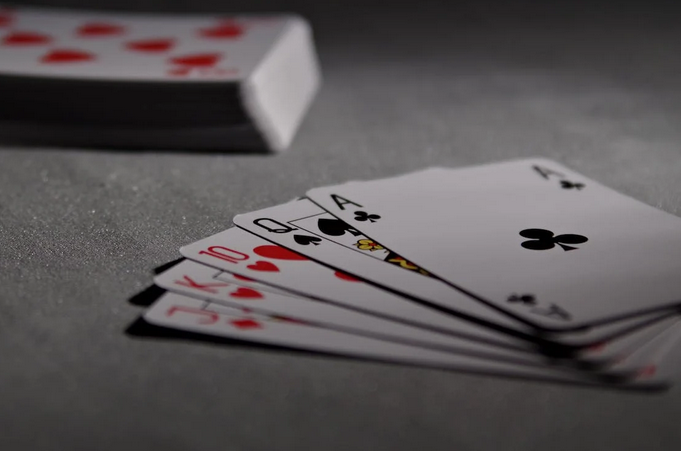Poker is a game that has captivated players for centuries. It’s a game of skill, strategy, and nerve-wracking excitement that keeps millions of people around the globe coming back for more. But before you start playing popular online poker in Australia and raking in those chips, it’s essential to understand the basic rules of poker. In this beginner’s guide, you’ll get insight into the basic poker rules and some handy strategies to get you started on your winning streak.
Basic Poker Rules

Understanding the basic rules of poker is crucial if you want to play and succeed in this thrilling card game. Poker involves a combination of luck and skill, as players aim to create the strongest hand possible or bluff their way to victory.
- The Deck: Poker is enjoyed with a standard 52-card deck. Some variations, such as Texas Hold ’em, may include one or two jokers.
- The Blinds: Before any cards are dealt, two players must place mandatory bets known as blinds. These bets help generate a pot players compete for during the hand.
- Dealing the Cards: Each player is dealt two “hole cards” face down, which only they can see. In certain games, such as Texas Hold ’em and Seven Card Stud, there will be additional rounds of betting and card dealing afterward, where each player will receive additional cards to form their hand.
- Betting Rounds: Following each round of card dealing, there will be a round of betting in which players must decide if they want to call (match the highest bet), raise (increase the bet), or fold (give up). This continues until all active players match the highest bet or fold their hands.
- Showdown: If more than one player remains after all betting rounds have been completed, there is a “showdown” in which all remaining players reveal their cards, and the player with the strongest hand wins the pot.
Poker Strategy for Beginners
Whether playing at a casino or with friends, understanding the basics of poker strategy can greatly increase your chances of winning. It’s important to understand the value of your hand. Knowing which hands are strong or weak will guide your decision-making throughout the game. Familiarize yourself with the different hand rankings to quickly assess whether you have a winning hand.
Another crucial aspect of poker strategy is knowing when to fold. It can be tempting to hold onto every hand, hoping to get lucky, but this approach rarely pays off in the long run. Learn how to read the table and recognize when to cut your losses and fold.
Bluffing is another valuable skill in poker strategy, but it should be used sparingly and strategically. Bluffing involves making others believe that you have a stronger hand than you do. This can be an effective tactic if done correctly but proceed cautiously, as experienced players may see through your bluff.
The Players’ Acceptable Manner
 In addition to these basic strategies, observing other players’ behavior and taking note of their betting patterns can provide valuable insights into their hands. Remember that practice makes perfect when developing a successful poker strategy. Don’t be discouraged by early losses – use each experience as an opportunity for growth and learning.
In addition to these basic strategies, observing other players’ behavior and taking note of their betting patterns can provide valuable insights into their hands. Remember that practice makes perfect when developing a successful poker strategy. Don’t be discouraged by early losses – use each experience as an opportunity for growth and learning.
Whether you’re a novice player or looking to improve your skills, understanding these fundamentals is essential for a successful poker experience. Poker is not mere luck; it requires strategic thinking, observation skills, and patience. By familiarizing yourself with the rules and practicing your gameplay, you can improve your chances of winning at the casino or in friendly home games.…


 The excitement in
The excitement in  While some people may not care about the money involved in poker, others love it because there is a lot of potential to win big. Poker can be a very lucrative
While some people may not care about the money involved in poker, others love it because there is a lot of potential to win big. Poker can be a very lucrative 
 Now that you have some basic skills, it’s time to put them into practice. When playing poker, it’s important to remember that the aim of the game is not to win every hand but rather to make money in the long run. It means that you need to be smart with your bets and only bet when you have a good chance of winning.
Now that you have some basic skills, it’s time to put them into practice. When playing poker, it’s important to remember that the aim of the game is not to win every hand but rather to make money in the long run. It means that you need to be smart with your bets and only bet when you have a good chance of winning.
 The first skill you must learn is basic arithmetic. A smart poker player understands the odds of each game and the optimal card combinations. Poker, like other card games, is a game of chance. It is strongly reliant on statistics and probability. You understand the possibilities of a flush or river card and when to fold or fold. This facet of poker is frequently overlooked by poor players, who subsequently pay the price. Don’t be one of those people that plays poker. Make sure you understand your chances of success.
The first skill you must learn is basic arithmetic. A smart poker player understands the odds of each game and the optimal card combinations. Poker, like other card games, is a game of chance. It is strongly reliant on statistics and probability. You understand the possibilities of a flush or river card and when to fold or fold. This facet of poker is frequently overlooked by poor players, who subsequently pay the price. Don’t be one of those people that plays poker. Make sure you understand your chances of success. The second ability that comes into play is psychology. Understanding your opponent and forecasting his future movements is the most crucial talent of all. Knowing what your opponent has in his hand and comprehending what you think he has is the most critical skill. If you can precisely estimate these three things, you will have the edge over other players. It is very crucial while playing no-limit or limit games. In these games, bluffing is more prevalent. This is true for both a tournament at a friend’s house and an online match. Throughout the game, keep an eye on your opponent’s actions. Keep an eye out for players that bluff frequently but have poor cards.
The second ability that comes into play is psychology. Understanding your opponent and forecasting his future movements is the most crucial talent of all. Knowing what your opponent has in his hand and comprehending what you think he has is the most critical skill. If you can precisely estimate these three things, you will have the edge over other players. It is very crucial while playing no-limit or limit games. In these games, bluffing is more prevalent. This is true for both a tournament at a friend’s house and an online match. Throughout the game, keep an eye on your opponent’s actions. Keep an eye out for players that bluff frequently but have poor cards.
 One of the most important things you should know when playing poker is finding the right poker room. Poker is basically a game where you have to put the cards in a certain order to get a winning or losing hand.This is important to remember.
One of the most important things you should know when playing poker is finding the right poker room. Poker is basically a game where you have to put the cards in a certain order to get a winning or losing hand.This is important to remember. The first round of the modern poker game starts with a forced bet. After that, the betting continues from left to right. Either the player matches the highest bet placed in the previous round or folds. The possibility of the player reaching the bet can increase the bet.
The first round of the modern poker game starts with a forced bet. After that, the betting continues from left to right. Either the player matches the highest bet placed in the previous round or folds. The possibility of the player reaching the bet can increase the bet. In playing poker, many people are heated with the game and lose it. It is very important that you remain calm. Believing that this type of betting will yield positive results, players often bet money voluntarily. The poker outcome of the game depends largely on luck.…
In playing poker, many people are heated with the game and lose it. It is very important that you remain calm. Believing that this type of betting will yield positive results, players often bet money voluntarily. The poker outcome of the game depends largely on luck.…
 You will lose a poker hand at some point due to a draw or a bad beat, sometimes caused by a bad player. Keep a cool head and avoid tilting in these situations. A tilt in poker can be a very bad situation. This is because it can cost good players the opportunity to win. You should keep your cool no matter what happens in the game.
You will lose a poker hand at some point due to a draw or a bad beat, sometimes caused by a bad player. Keep a cool head and avoid tilting in these situations. A tilt in poker can be a very bad situation. This is because it can cost good players the opportunity to win. You should keep your cool no matter what happens in the game. Always look for ways to improve your poker game. Learning a poker strategy is very important to increase your chances of winning. You must learn ways to level up your game. You can do this by learning from experts and doing some research. In fact, this is how many people know to improve.
Always look for ways to improve your poker game. Learning a poker strategy is very important to increase your chances of winning. You must learn ways to level up your game. You can do this by learning from experts and doing some research. In fact, this is how many people know to improve. If you want to become a professional player, the most important thing is to learn to follow your instincts. You can sense that something is wrong with a poker hand. Your instincts are more important than your feelings. Is your opponent right when he shows a hand? If your gut tells you no, you should think about it.
If you want to become a professional player, the most important thing is to learn to follow your instincts. You can sense that something is wrong with a poker hand. Your instincts are more important than your feelings. Is your opponent right when he shows a hand? If your gut tells you no, you should think about it.
 One of the important things that you need to know is some strategies. Don’t be tempted to bet on every combination. This can happen if you become too dependent on the action or tilt of the
One of the important things that you need to know is some strategies. Don’t be tempted to bet on every combination. This can happen if you become too dependent on the action or tilt of the  You can use your instincts. Always pay attention to the other players and the cards that are dealt. Some wins can throw you off balance and make it hard to come up with winning strategies. This is a bad move. You can soon lose a lot of money.
You can use your instincts. Always pay attention to the other players and the cards that are dealt. Some wins can throw you off balance and make it hard to come up with winning strategies. This is a bad move. You can soon lose a lot of money.





